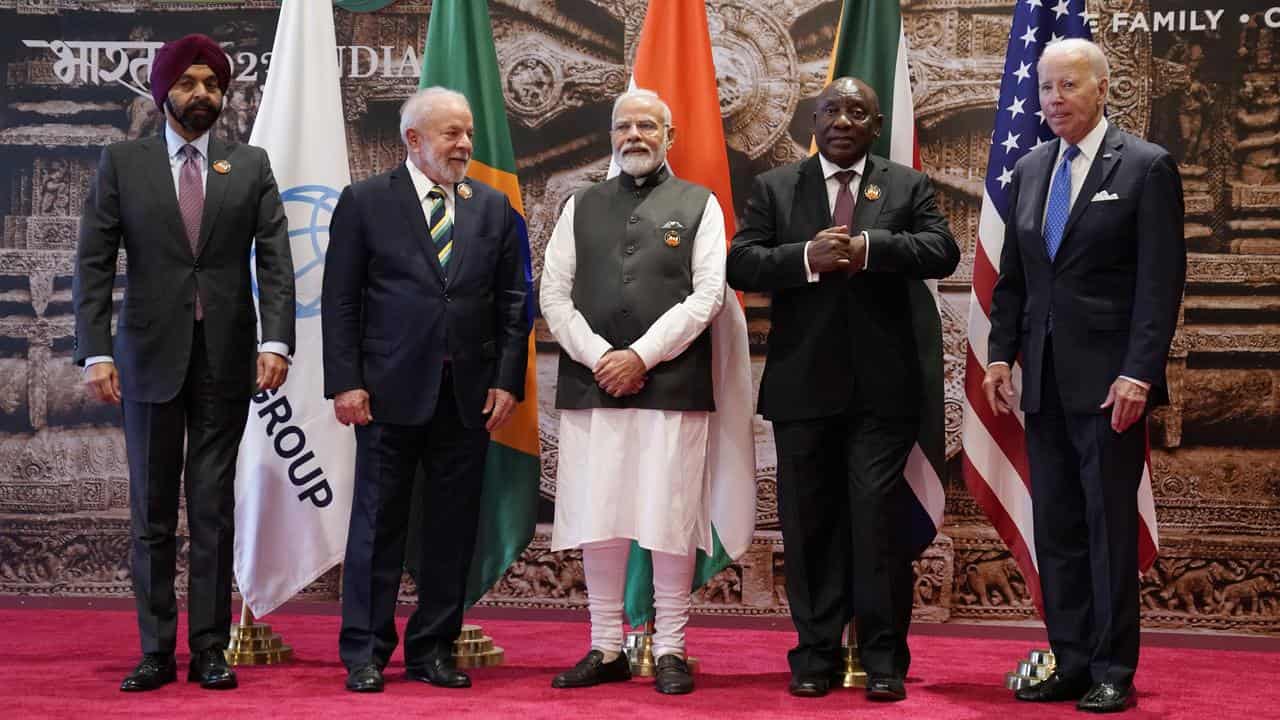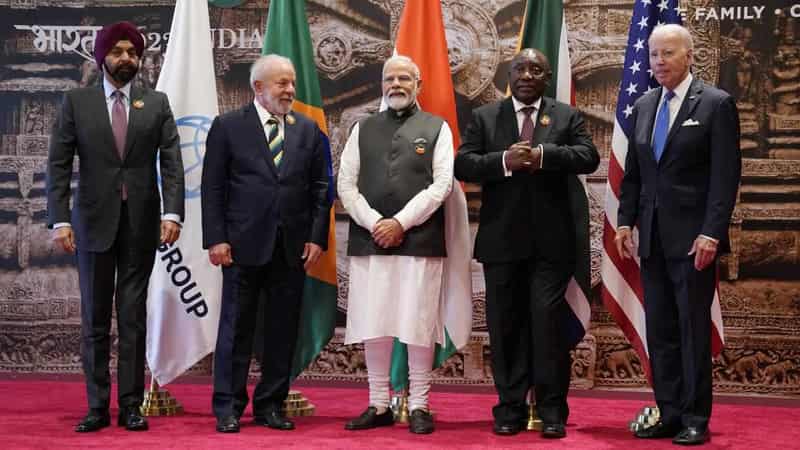
The G20 has adopted a consensus declaration on issues facing the bloc, Indian Prime Minister Narendra Modi has announced during a summit, signalling negotiators have resolved deep differences over the wording on the war in Ukraine.
Modi gave no details on the compromise wording.
"On the back of the hard work of all the teams, we have received consensus on the G20 Leaders Summit Declaration," he told the G20 leaders in New Delhi.
"I announce the adoption of this declaration."
Earlier Modi inaugurated the two-day meeting by calling on members to end a "global trust deficit" and announced that the bloc was granting permanent membership to the African Union (AU) n an effort to make it more representative.
"Today, as the president of G20, India calls upon the entire world to first convert this global trust deficit into one trust and one confidence," he said.
"It is time for all of us to move together."
The group is deeply divided over the war in Ukraine, with Western nations pushing for strong condemnation of Russia in the Leaders' Declaration, while others were demanding a focus on broader economic issues.
The wording could be similar to language in the declaration issued in Indonesia at the 2022 summit, which noted that while most nations condemned Russia for the invasion, there were also divergent views.
An earlier 38-page draft of the final statement reviewed by Reuters left the "geopolitical situation" paragraph blank, while there was agreement on 75 other paragraphs covering issues ranging from global debt and cryptocurrencies to climate change.
At the start of the day, United States President Joe Biden and other leaders were driven through deserted streets to a new, $US300 million ($A470 million) conch-shaped convention centre called Bharat Mandapam, opposite a 16th-century stone fort, for the summit.
Biden will press for a higher level of climate action at the summit, a White House official said, as concerns grow about the lack of consensus on cutting emissions.
European Commission President Ursula von der Leyen said she had asked G20 leaders to join a proposal to set up global carbon pricing.
The G20 nations account for 80 per cent of global emissions and their views are being keenly watched ahead of the COP 28 meeting in the United Arab Emirates.
Modi, in his opening remarks, invited the AU, represented by chairperson Azali Assoumani, to take a seat as a permanent member.
"This will strengthen the G20 and also strengthen the voice of the Global South," said a message on Modi's official account on social media platform X, formerly known as Twitter.
Chinese President Xi Jinping is skipping the meeting and has sent Premier Li Qiang instead, while Russia's Vladimir Putin will also be absent.
Biden, Australian Prime Minister Anthony Albanese, German Chancellor Olaf Scholz, French President Emmanuel Macron, British Prime Minister Rishi Sunak, Saudi Arabia's Mohammed Bin Salman and Japan's Fumio Kishida, among others, are attending.
The summit had been seen as affording a venue for a possible meeting between Xi and Biden following months of efforts by the powers to mend ties frayed by trade and geopolitical tensions.
Jon Finer, the US deputy national security adviser, told reporters in Delhi there was speculation China was "giving up on G20" in favour of groupings such as BRICS, where it is dominant.
BRICS includes Brazil, Russia, India, China and South Africa, and has agreed to add another six members - Saudi Arabia, Iran, Ethiopia, Egypt, Argentina and the United Arab Emirates - accelerating its push to reshuffle a world order it sees as outdated.
Russia is being represented by Foreign Minister Sergei Lavrov, who has said he will block the final declaration unless it reflects Moscow's position on Ukraine and other crises.
One source told Reuters earlier on Saturday a joint G20 declaration might or might not come to a unanimous agreement.
In the absence of an agreement, India would have to issue a chair statement, which would mean for the first time in 20 years of summits, the G20 would not have a declaration.









